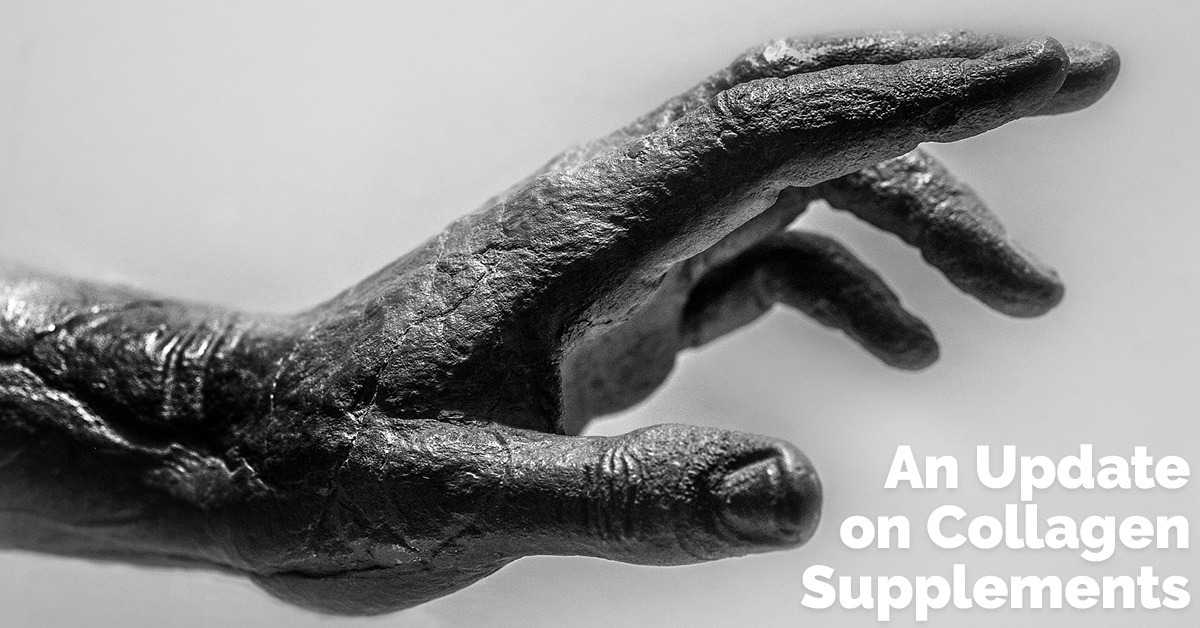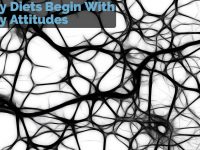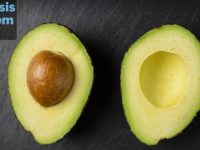As many of you know, in the past I’ve taken a critical stance on dietary collagen protein and recommended against it as a supplement. Science evolves, however, and given the new research that has come out since I first took my stance, I thought it an appropriate time to revisit the topic and potentially reevaluate my opinion.
To help with this, I reached out to Dr. Keith Baar, the senior author on the paper that is primarily responsible for this article. First though, let me recap the stance I’ve held so the context of my conversation with him is clear!
A Quick Recap on Collagen Supplements
My argument against collagen has been centered around two related points:
First, collagen is a poor-quality protein from a dietary standard as it is extremely limited in the amino acids it contains. Collagen is abundant in glycine, proline, and hydroxyproline—all of which are inessential (our body can produce them itself)—and deficient in all the essential amino acids. With this in mind, hypothetically our ability to produce collagen should not be limited by amino acid availability (since collagen mostly doesn’t contain any we can’t produce ourselves), at least provided we supply our body with adequate protein.
Second, no trial has compared a dietary collagen supplement to a high-quality protein. Since a high-quality protein supplies both the inessential amino acids that collagen is rich in as well as the essential ones it lacks, it’s plausible that a high-quality protein would be equally (or more) effective than dietary collagen at boosting collagen production.
There are a few more points I’ve made as well, but they are secondary to these first two. In particular, the second one has been my “sticking point” because it is more easily testable than the first and would provide a clear answer to the question; if collagen is more effective, it would show up in the data (and vice versa)!
New Research by Dr. Keith Baar
A couple years ago, Dr. Baar and his team released a paper that demonstrated the efficacy of dietary collagen in promoting collagen synthesis in two parts, the first using an engineered ligament and the second with blood levels of procollagen I N-terminal peptide (PINP). The PINP blood test showed that in vivo collagen formation increased after collagen supplementation, with the caveat that PINP is more a marker of bone metabolism than connective tissue since bone has a greater turnover rate than tendons or ligaments. The engineered ligament test (an in vitro test) helped fill in the gap by demonstrating that a ligament would also take up the appropriate amino acids if exposed to them, in this case through serum drawn from participants who had recently consumed a gelatin supplement.
(It’s also important to note that the trial used a special exercise and timing protocol for the supplementation. The key is that our tendons and ligaments are poorly vascularized, so we need to improve blood flow with exercise to sufficiently expose them to our amino acid-enriched blood.)
I believe I wrote about the paper at the time, but didn’t change my opinion because the trial compared dietary collagen to maltodextrin (a carbohydrate). While it did demonstrably show that dietary collagen has a positive effect on physiological collagen synthesis, it didn’t address whether it would be better than just having a serving of protein since we wouldn’t expect maltodextrin to have any effect on collagen synthesis while we would expect a protein (even a low-quality protein) to have at least some effect.
Though it wasn’t sufficient at the time to convince me, recently there’s been a surge in popularity for collagen protein supplements and I wanted to be sure I wasn’t missing anything. So, I reached out to Dr. Baar to see if he could provide some insight. Here’s what we wrote to me:
Thanks for the question. I like your analysis and explanation for why you argue against dietary collagen. In principle, I agree with everything you’ve said. There hasn’t been a trial comparing collagen to whey protein. We are doing that at the moment, but these studies are not easy. It is really hard to measure collagen synthesis in people.
The only data I know of as to why collagen might be useful compared to whey protein for connective tissue comes from Luc van Loon. He has found that when you take whey protein, glycine levels in the blood drop significantly, to the point that glycine (every third amino acid in collagen) could limit collagen synthesis. The data haven’t been published yet, but it is really interesting and suggests that having some glycine rich protein may be necessary for collagen synthesis.
In the meantime, my view is that since there are no counter indications, collagen is not known to cause kidney, liver, or other issues, if it might increase collagen synthesis and help someone stay healthy there is no downside. I tell people that it might be helpful to take before loading and many tell me stories of how it changes their lives. But I realize that this could all be a placebo effect. If in the end the research comes back negative, collagen intake has nothing to do with collagen synthesis, they won’t have lost anything or put themselves at risk. If in 5 years we look back on clear evidence that it works, they will have had a small jump on the crowd.
Dr. Baar also emphasized the need for more studies, which require funding. He said that many (if not most) collagen producers have reached out to his lab in regard to funding research, but when the question comes up about what would happen if the results are negative, he responds that they would publish regardless and the companies typically don’t write back. Unfortunately, this type of research isn’t “interesting” to federal funding agencies, so as a result it’s hard to secure adequate funding to perform large numbers of studies (or large studies).
Where to Go From Here
I really appreciate Dr. Baar’s insight and neutral approach, and I don’t disagree with his argument. It could be that in five years we have the data to suggest dietary collagen protein is superior to high-quality proteins in terms of collagen synthesis and you’ll have had five years of benefit. Alternatively, five years from now the data could suggest collagen doesn’t work any better than another protein (or is inferior) and you’ll have wasted some money but will otherwise be healthy and unharmed. You can make a reasonable argument both directions, so we’ll just have to wait for the research to give us more direction in the future; the important thing is to be open to the possibility you’re wrong and willing to change your mind!
In any case, keep in mind that supplements are just that: supplements. The most important nutritional factors in collagen synthesis and repair will continue to be adequate calories and protein (without which you will impair overall physiological protein synthesis), and improving the strength of your connective tissue will still demand appropriate loading and rest.
I still recommend against using any collagen-based protein (gelatin, beef protein isolate, hydrolyzed collagen peptides, etc.) as a protein supplement—that is, don’t replace the protein in a meal with it, or use it in a protein shake instead of a more conventional whey, casein, soy, or whatever. Collagen lacks sufficient quantities of the essential amino acids to be a good source of protein, including leucine (the metabolic “signal” amino acid for muscle protein synthesis), and replacing a regular protein with collagen-based protein is akin to reducing your overall daily protein intake.
Thank you to Dr. Baar for taking the time to respond to me, and if any of you reading this know of any potential sponsors for his research I’m sure he’d appreciate hearing from you! You can contact me and I’ll pass along your information. And, as always, if you have questions or comments please don’t hesitate to send them my way.















Im concerned about his comments about whey protein depleting glycine which is necessary for collagen synthesis. I get very sore finger joints and I’ve started taking PhD whey protein. It contains glycine but would this be enough to counteract any losses. To be honest I’d been really hopeful about what Eric horsts been talking about regarding vitamin c enriched collagen so feeling a bit deflated now. Should I be taking a glycine supplement before climbing and if so how much?
Any chance of a climbsci podcast on the subject?
Great work by the way I’m really enjoying the articles and podcasts.
Right now, I’m not too concerned with the risk of glycine depletion due to whey. All we can say (and we can’t even really say it yet since the results aren’t published!) is that there is a potential interaction from whey protein wherein we notice a drop in plasma glycine—but we can’t say whether that would affect collagen production or not, either acutely or chronically. This is a good example of why we need actual comparison data, because while we can guide our hypotheses using more abstract data (like the plasma levels of glycine) it doesn’t mean the predicted effect will be present in a real-world situation. A good thing to keep in mind is that until recently, we’ve had no control over the exact amino acid composition of our diets, relying instead on a large variety of proteins which contain varying levels of different amino acids. It’s safe to assume our body is capable of compensating for these natural variances, and that if we consumed a diet that was higher in dairy protein one week we wouldn’t accidentally impair necessary biochemical functions. It’s not that they couldn’t have some effect—just that the effect is likely to be small and probably more of academic interest than clinical. So, I wouldn’t recommend supplementing with glycine in the meantime!
As for a ClimbSci episode, I’m sure Tom would love to cover it, so we’ll probably tackle it sometime!
Thanks for the update! Would be great if you could make a suggestion about practical ways of following a corresponding exercise/supplement routine. Haribos + OJ + Hangboarding for breakfast? 😉
What I don’t get from Baar’s paper (Shaw et al 2017), is that the breaking force (MTL) of the engineered tendons did NOT increase when you compare placebo to 5/15g collagen supplement (Fig 4B).
In the discussion they state:
“The enrichment of the serum with these components 1 h after consuming the gelatin supplement was sufficient to increase the collagen content and mechanical properties of engineered ligaments. ”
Which is true, but also true of the placebo (exercise only), so I find it a bit misleading. Later on they confirm this interpretation:
“A second interesting finding was that the engineered ligaments showed an increase in mechanics in all of the supplement groups, although the collagen content of the constructs only increased in the gelatin supplemented groups. ”
Isn’t increased MTL what we are ultimately aiming for with this supplement? I’m confused why that is not emphasized further.
You bring up a good point, which is that by itself increasing the collagen content of a tendon or ligament does not necessarily increase the tensile properties as well. In the context of this study, I think the main purpose of the engineered ligament piece was to demonstrate that a ligament would take up plasma amino acids for the use of collagen protein synthesis. The branch of the study using humans could not really demonstrate this since the marker they used (the best marker we have for collagen protein synthesis) predominantly shows bone collagen development, so the engineered ligament provided some plausibility to the hypothesis that dietary collagen proteins would also affect tendons and ligaments (and not just bones). Thus, I think the protocol was more designed for this demonstration rather than an improvement in strength, though of course an improvement in strength would have made for a more compelling conclusion.
Big picture, I think there’s enough physical evidence that greater cross-sectional area—greater collagen mass—in a tendon or ligament should lead to improved tensile strength, but whether a short-term study like this one could demonstrate that is questionable, especially given the slow rate of connective tissue growth. That being said, there are numerous types of collagen and not are equally strong; the collagens we build in our tendons and ligaments can also have different amounts of cross-linking and thus different tensile strengths. Simply increasing collagen content doesn’t mean an increase in strength, but the hope is that if you’re otherwise doing the right things for the development of strong tendons and ligaments then a greater formation of collagen protein within them will further increase strength.
Someone on reddit had some interesting comments on this: collagen supposedly contains much more glycine than e.g. whey
https://www.reddit.com/r/climbharder/comments/cev21f/an_update_on_dietary_collagen_protein/
I pasted the post below.
> First, collagen is a poor-quality protein from a dietary standard as it is extremely limited in the amino acids it contains. Collagen is abundant in glycine, proline, and hydroxyproline—all of which are inessential (our body can produce them itself)—and deficient in all the essential amino acids. With this in mind, hypothetically our ability to produce collagen should not be limited by amino acid availability (since collagen mostly doesn’t contain any we can’t produce ourselves), at least provided we supply our body with adequate protein.
This is what I thought at first along with the fact that whey (protein rich) could potentially be an adequate substitute. However, the more research I did, the more I saw this was probably objectively not true.
A bunch of this is research I’ve been doing for the tendinopathy book.
> In a previous paper, we pointed out that the capability to synthesize glycine from serine is constrained by the stoichiometry of the glycine hydroxymethyltransferase reaction, which limits the amount of glycine produced to be no more than equimolar with the amount of C 1 units produced. This constraint predicts a shortage of available glycine if there are no adequate compensating processes. Here, we test this prediction by comparing all reported fluxes for the production and consumption of glycine in a human adult. Detailed assessment of all possible sources of glycine shows that synthesis from serine accounts for more than 85% of the total, and that the amount of glycine available from synthesis, about 3 g/day, together with that available from the diet, in the range 1.5-3.0 g/day, may fall significantly short of the amount needed for all metabolic uses, including collagen synthesis by about 10 g per day for a 70 kg human. This result supports earlier suggestions in the literature that glycine is a semi-essential amino acid and that it should be taken as a nutritional supplement to guarantee a healthy metabolism.
> https://www.ncbi.nlm.nih.gov/pubmed/20093739
> Second, no trial has compared a dietary collagen supplement to a high-quality protein. Since a high-quality protein supplies both the inessential amino acids that collagen is rich in as well as the essential ones it lacks, it’s plausible that a high-quality protein would be equally (or more) effective than dietary collagen at boosting collagen production.
I also did some research into the amount of glycine in similar protein supplements such as whey and soy and it’s a very small amount (1.8g per 100g in whey and 2.6g per 100g in soy) for about 2% average while the glycine content of collagen is 26g per 100g or 25% dry weight. The usual supplement weight in most studies is 15g of collagen, so you’re effectively getting approximately 3.75g of glycine per supplemental intake of collagen while if you’re taking the traditional scoop of whey you’re only getting about 1/3 of 1.8g which is .6g of glycine. Pretty much nothing.
If the rate limiting step is about 10g per day and body can produce 3g with another 1.5-3g from dietary sources, I’d suggest the proper intake should be around 20-25g of collagen in the supplement in order get another ~4-5.5g of glycine to match the rate limiting reaction. So supplementing glycine or collagen (which is rich in glycine) can possibly overcome rate limiting steps while compared to different common protein sources will not.
I am surprised Keith Baar did not bring up these arguments in the article.
Whether it will increase collagen synthesis to the point it makes an objective difference is another matter though. It could just be small gains that may add up to a non-significant result but one that can potentially help some people.
TL;DR
I agree with the conclusion that it won’t hurt and may help.
Without more proper studies, it’s probably for those with extra disposable income who may want probable marginally better gains.
I’d be wary of anyone shilling their particular supplement and probably avoid them altogether.
If you do want to try it, Vitamin-C enriched collagen is probably the way to go. You can make your own with vitamin C and gelatin
Edit: this is a lot of what I’ve been doing instead of posting often here… so sorry for not being on here more. Trying to finish the book manuscript!
The big consideration here is the “if”—that is, if the rate-limiting step means our body is incapable of producing sufficient glycine and we must get more from our diet, then glycine-rich food sources would be beneficial. If, on the other hand, that number is erroneous, then we can’t say anything.
I’m aware of the study you cited, and I’m sure Dr. Baar is as well (though I don’t know his thoughts on it). My qualm with it is that there is nothing experimental about the paper—it follows some biochemical logic to arrive at the conclusion that we are in a perpetual 10 g/day deficit of glycine. The authors also base their conclusion, ultimately, on a guess; they state that there would be no deficit at all if 98% of the glycine from broken-down collagen was recycled, but are incredulous that our body would actually recycle this much and so use 95% as their figure for glycine recyling instead (citing that cysteine recycling is only 85%). The problem is that despite all the biochemical logic we still don’t know how much glycine is actually recycled, and the amount of cysteine we recycle is not indicative of how much glycine we recycle so saying we recycle only so much cysteine doesn’t tell us our body follows the same path (clearly it doesn’t, otherwise there would be no way we could meet our physiological need for glycine!). I think we can confidently say that the idea that the average human is running a 10 g/day deficit in glycine is unlikely, however, as that would surely have easy-to-notice long-term consequences!
I look forward to your book, let me know when you publish!
Thanks for the article. You bring up valid points, but in the face of uncertainty I prefer to err on the more conservative (evolutionarily appropriate, collagen-rich diet) side. Regarding the “low quality” of collagen supplements, you may enjoy this recent article: “Significant Amounts of Functional Collagen Peptides Can Be Incorporated in the Diet While Maintaining Indispensable Amino Acid Balance” https://www.ncbi.nlm.nih.gov/pmc/articles/PMC6566836/
Looking forward to more on this!
Detrick
Interesting article, although I’m uncertain why the authors don’t think unhydrolyzed collagen proteins will be unlikely to yield “functional collagen peptides”. Their hypothesis that consuming only a limited amount (2.5 – 15 g/day) feels better than the tact other researchers have taken, though feelings are admittedly not a great metric for most parts of the scientific process. Also, perhaps they were simply limited by the NHANES data, but it felt like a weird choice to judge collagen intake by sausage and frankfurter consumption—I’m not sure eating more sausages is really the right move health-wise, even if they provide more collagen than other foods in our diet!
Whoa, I just listened to a podcast featuring Dr Baar about tendons, and was looking for more information. Here I am stumbling along your post that has even more details on it. Awesome! Thank you for this article Brian!
My interest was spurred when I switched away from whey and to Redcon1 MRE series which is a meat-based protein. My body agrees with dairy and I love the taste and as such, I’m a big dairy fan (drink milk, eat greek yohgurt and cheese, and then I’d have copious amounts of whey.)
I should have tried more protein variety to begin with, but the idea of the building blocks of collagen being lower in dairy in super interesting.
Hello
Interesting article
Would you have a specific recommandation for a good quality whey protein brand/product that would, in your opinion, be a better choice instead of collagen ?
I’m new to this complements world and it’s just totally frightening, so much different products !
I’m a 34’yo moderate level climber with regular pains in shoulders, elbows, wrists…I warm up ok but I got those anyway, at work, everyday for everything… even at home, doing a few DIY things on the house can make my elbows Hurt for a few hours,
I was looking for something to help my joints and tendons to get stronger. I came across Eric’s.”supercharged collagen”, and doing some research, found your blog. Any help appreciated.
Thanks !
Hi Victor,
When I buy whey protein, I usually buy it from truenutrition.com—they’re a bulk supplier and they have a few choices (which are all decent, it just depends if you have specific preferences diet-wise like grass-fed). They have decent flavors, as well, at least for protein shakes, and they’re reasonably priced.
As for tendon and joint strength or pain, I’m not an exercise physiologist so I may not be the best source, but I can say that they have a much poorer blood supply than our muscles, bones, and other tissues. Thus, one of the keys to strengthening them is simply getting the blood flowing there for adequate time to nourish them, which is best accomplished with higher-rep, lower-load exercises. Protein before you perform these types of exercises may be beneficial with the idea that you’ll have be better able to deliver amino acids to them—but really, adequate protein in general (regardless of timing) is the first nutritional priority.
I hope that helps, and please don’t hesitate to reach out if you need more information! You can comment again here or send me an email via the about page.